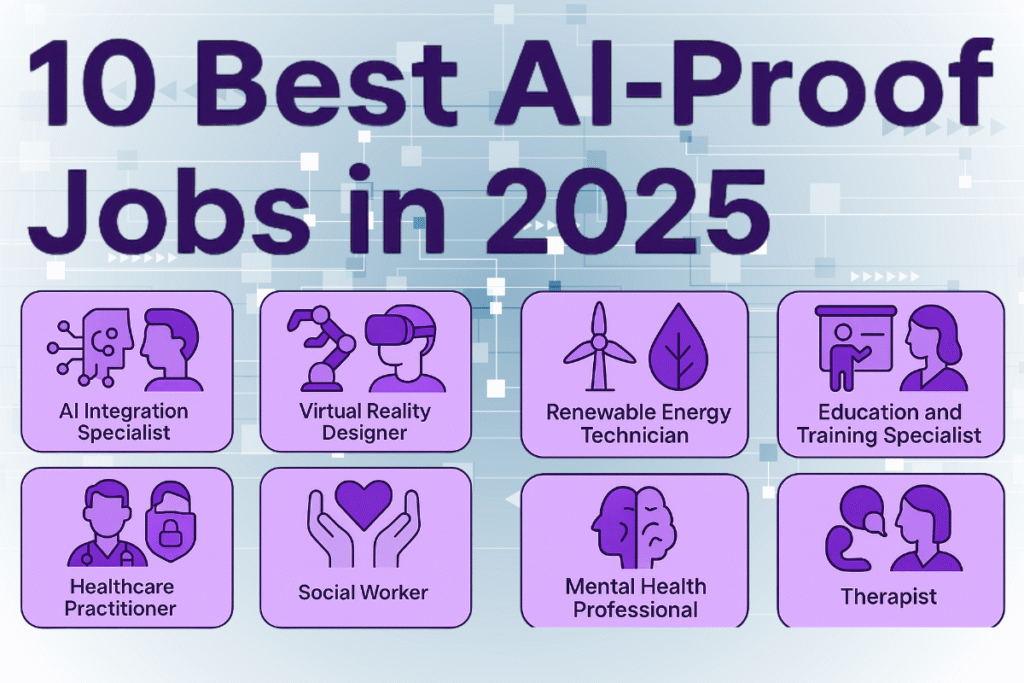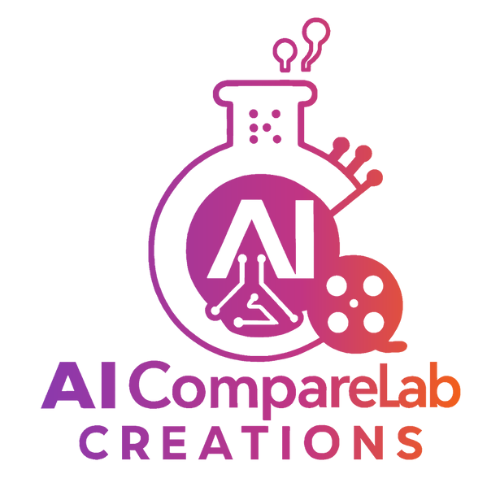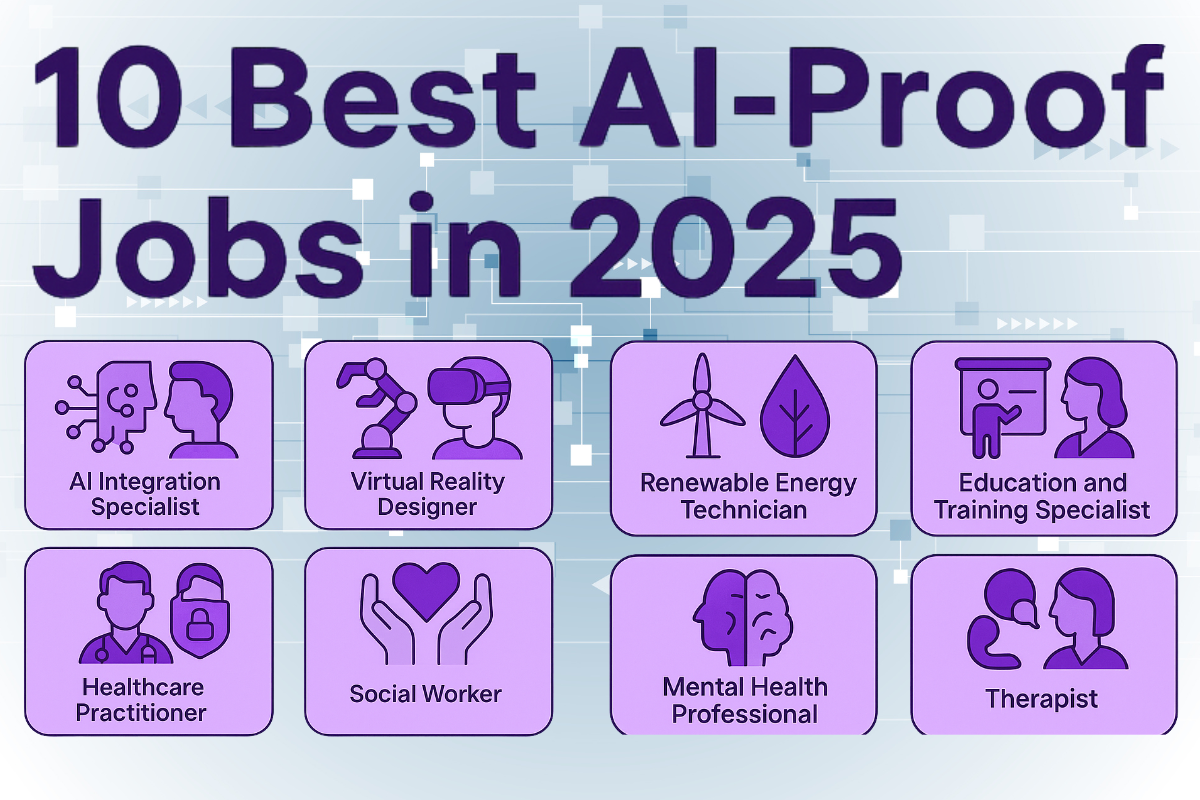10 Best AI-Proof Jobs in 2025: Stay Secure, Not Scared
“Is AI coming for YOUR job?” It’s no longer hypothetical—Geoffrey Hinton, the “Godfather of AI,” warns it could eventually surpass human capability in nearly all fields, with only a few truly safe roles like plumbing or healthcare standing firm. Adobe says up to half of entry-level white-collar roles might vanish within five years. But here’s the good news: not all work is replaceable. In fact, some careers are evolving—growing more indispensable. Whether you’re a Gen Z graduate or a mid-career professional, this guide unveils 10 AI-proof jobs to build your future on, complete with real steps to pivot successfully.

What Makes a Job AI-Proof?
Jobs resistant to AI disruption share three key traits:
- Human connection: Roles that require empathy, emotional intelligence, or social nuance.
- Complex problem-solving: Situations without predictable outcomes.
- Physical skill or presence: Hands-on tasks, especially in dynamic environments.
“It’s not about fighting machines—it’s about doing what they simply can’t.”
Top 10 AI-Proof Jobs in 2025
1. Healthcare Professionals (Doctors, Nurses, Physical Therapists)
AI may assist diagnosis, but it can’t hold a patient’s hand or adjust a treatment plan on the fly. Empathy and judgment still reign supreme.
2. Electricians and Skilled Tradespeople
Wiring a building, fixing a boiler, or solving a real-world problem in someone’s home is physical, unpredictable, and rooted in real-time adaptation—perfectly AI-proof.
3. Educators & Trainers
AI can deliver content, but it can’t build relationships, tailor motivation strategies, or guide students emotionally.
4. Mental Health Counselors and Therapists
Emotional depth, lived experience, and complex social nuance are far beyond AI’s grasp. Demand is soaring post-pandemic.
5. Creative Professionals (Writers, Designers, Filmmakers)
AI can generate drafts, but the nuance of voice, emotional arcs, and audience resonance still requires humans.
6. Social Workers and Caregivers
These roles demand compassion, adaptability, and trust-building with vulnerable populations.
7. AI-Human Integration Specialists
These “AI whisperers” help teams adopt AI tools ethically and practically, bridging human workflows with machines.
8. VR/AR Experience Designers
This field blends psychology, storytelling, and spatial design—ideal for creative human input.
9. AI Ethics & Policy Professionals
As AI expands, companies and governments need help with digital rights, policies, and risk assessment.
10. Advanced Technicians & Maintenance Roles
Even robots break down. Skilled humans who maintain machines are crucial.
How to Pivot into an AI-Proof Career
- Start small: Use platforms like Coursera, Udemy, or LinkedIn Learning.
- Mix soft and hard skills: EQ + basic AI literacy wins over technical skills alone.
- Find mentors: Communities like Reddit or LinkedIn can help you pivot confidently.
How to Showcase Your Human Value
In resumes and interviews:
- Emphasize adaptability, leadership, and creativity.
- Use real stories or project examples that reflect emotional or social value.
- Frame AI as a tool—and highlight your role in using it wisely.
The Future Belongs to the Adaptable
AI isn’t the end of the workforce. It’s the evolution of it. If you’re willing to learn, adapt, and focus on your irreplaceable human strengths, the future is not something to fear. It’s something to shape.
Sources Cited
- Pew Research: AI in the Workplace
- Exploding Topics: AI Job Disruption Stats
- World Economic Forum: Future of Jobs Report 2023
- The Guardian: Gen Z AI Job Loss Fears
- McKinsey: Future of Work in AI Age
Frequently Asked Questions
What does AI-proof mean?
AI-proof refers to jobs that are unlikely to be replaced by artificial intelligence due to their reliance on human empathy, physical presence, or complex judgment.
Will AI take over creative jobs like writing or filmmaking?
AI can support creative work but lacks the emotional nuance, cultural relevance, and originality that humans bring. Creative professionals are evolving, not vanishing.
How can I transition into an AI-proof career?
Start with online courses, build soft and technical skills, and look for mentorship communities. Platforms like Coursera and LinkedIn Learning are great starting points.
Are entry-level jobs at higher risk from AI?
Yes, entry-level white-collar jobs are among the most vulnerable. Building unique skills and human-centered abilities increases job security.
Can AI be used to protect jobs instead of replacing them?
Absolutely. When used wisely, AI can boost productivity, reduce burnout, and support decision-making—freeing humans to focus on what they do best.


